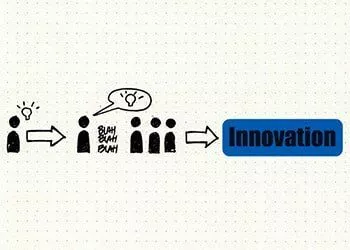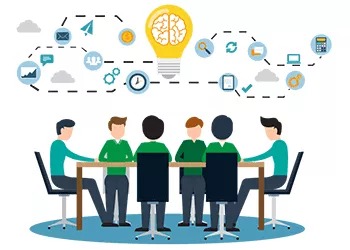Workplace communication skills are essential as companies must work efficiently and be productive. Employees can experience increased morale, productivity, and commitment when they have positive communication in the workplace.
A leader who spends time and energy creating open communication lines will quickly create trust among team members, resulting in better employee engagement which boosts productivity, performance, and overall morale. At the same time, employees who communicate effectively with their colleagues, managers, and customers remain valuable assets to a company.
Failure to communicate effectively in the workplace will inevitably lead to non-motivated staff that can begin to question their confidence in their skills and organizations.
The importance of strong communication runs deep within the workplace and should be a part of the company culture.
Related Read: Q&A: How PEO Services Benefit When Expanding into Singapore
 When employees can express their ideas openly, they are more likely to present them without fear of ridicule or retaliation. Innovation is highly dependent on this, and an organization that promotes communication is more likely to be innovative.
Related Read: 8 Tips to Build a Successful Team
When employees can express their ideas openly, they are more likely to present them without fear of ridicule or retaliation. Innovation is highly dependent on this, and an organization that promotes communication is more likely to be innovative.
Related Read: 8 Tips to Build a Successful Team
 Communication skills can grow and improve internally and externally. By establishing strong communication lines, you can increase the consistency of the externally delivered message with solid communication so that both internal and external stakeholders are on the same page.
Related Read: Q&A: What to Include in an Employee Handbook in Singapore?
Communication skills can grow and improve internally and externally. By establishing strong communication lines, you can increase the consistency of the externally delivered message with solid communication so that both internal and external stakeholders are on the same page.
Related Read: Q&A: What to Include in an Employee Handbook in Singapore?
Five Important Reasons Why Communication is Important in the Workplace are:
1. Innovation
 When employees can express their ideas openly, they are more likely to present them without fear of ridicule or retaliation. Innovation is highly dependent on this, and an organization that promotes communication is more likely to be innovative.
Related Read: 8 Tips to Build a Successful Team
When employees can express their ideas openly, they are more likely to present them without fear of ridicule or retaliation. Innovation is highly dependent on this, and an organization that promotes communication is more likely to be innovative.
Related Read: 8 Tips to Build a Successful Team
2. Growth
 Communication skills can grow and improve internally and externally. By establishing strong communication lines, you can increase the consistency of the externally delivered message with solid communication so that both internal and external stakeholders are on the same page.
Related Read: Q&A: What to Include in an Employee Handbook in Singapore?
Communication skills can grow and improve internally and externally. By establishing strong communication lines, you can increase the consistency of the externally delivered message with solid communication so that both internal and external stakeholders are on the same page.
Related Read: Q&A: What to Include in an Employee Handbook in Singapore?
3. Effective Communication
 When executives are strong communicators, they can be better team managers in the work environment. When you are a strong communicator, delegating activities, managing conflicts, motivating, and building relationships are much simpler (essential responsibilities of an administrator). Effective communication benefits people but allows them to talk to each other. Strong social channels are crucial to minimize any communication issues too.
Related Read: How can your workplace be a Happy Place
When executives are strong communicators, they can be better team managers in the work environment. When you are a strong communicator, delegating activities, managing conflicts, motivating, and building relationships are much simpler (essential responsibilities of an administrator). Effective communication benefits people but allows them to talk to each other. Strong social channels are crucial to minimize any communication issues too.
Related Read: How can your workplace be a Happy Place
4. Team Building
 Creating effective teams requires communication and mutual cooperation. You will be effective in building effective teams by implementing effective strategies such as those listed below to improve communication. This will increase morale, retention and employee satisfaction.
Related Read: 5 reasons companies should take their employees to Annual Offsites
Creating effective teams requires communication and mutual cooperation. You will be effective in building effective teams by implementing effective strategies such as those listed below to improve communication. This will increase morale, retention and employee satisfaction.
Related Read: 5 reasons companies should take their employees to Annual Offsites
5. Giving A Voice to All
 As mentioned earlier, employee satisfaction can be very much dependent on their having a voice and being listened to, whether it is with regard to an idea they have had or about a complaint they need to make. Consolidated communication lines should enable everyone to communicate freely with their colleagues, peers, and superiors at any level.
In.Corp does an Employee and Interdepartmental survey every year and tries to implement at least 70% of the changes/recommendations suggested by the employees.
Related Read: The 7 Rules for Building a Successful Team
As mentioned earlier, employee satisfaction can be very much dependent on their having a voice and being listened to, whether it is with regard to an idea they have had or about a complaint they need to make. Consolidated communication lines should enable everyone to communicate freely with their colleagues, peers, and superiors at any level.
In.Corp does an Employee and Interdepartmental survey every year and tries to implement at least 70% of the changes/recommendations suggested by the employees.
Related Read: The 7 Rules for Building a Successful Team
How Can You Improve Communication Effectiveness in Your Workplace?
In the following, we explain some key areas where organizations can enhance and improve communication between their teams.- Include Everyone: make sure that the communication lines are always open. Search and actively promote progress reports and project updates. This is especially important when it comes to remote personnel.
- Listen and Show Empathy: Communication is a two-way process; if you don’t listen and don’t encourage dialogue with the other party, no job or person can survive for a long time. Listening shows respect and allows you to become familiar with extraordinary problems you may have to solve as a manager or as an employer.
- Define Objectives and Expectations: Managers should provide clear and accessible goals for teams and individuals that define exactly what is required for a particular project and that all of the team is aware of the project’s objectives, the department, and the workplace as a whole.
- Send Your Message Clearly: Make sure your message is clear and accessible to the intended audience. To do this, it is important that you speak clearly and politely – to convey your message clearly without confusion or offence.
- Choose Your Medium Carefully: Once you have created your message, you must ensure it is translated through the right communication channels. While face-to-face communication is the best way to build employee trust, it is not always an option. Take time to decide if the information provided on a printed copy works better than an email or whether a general note is sufficient.


